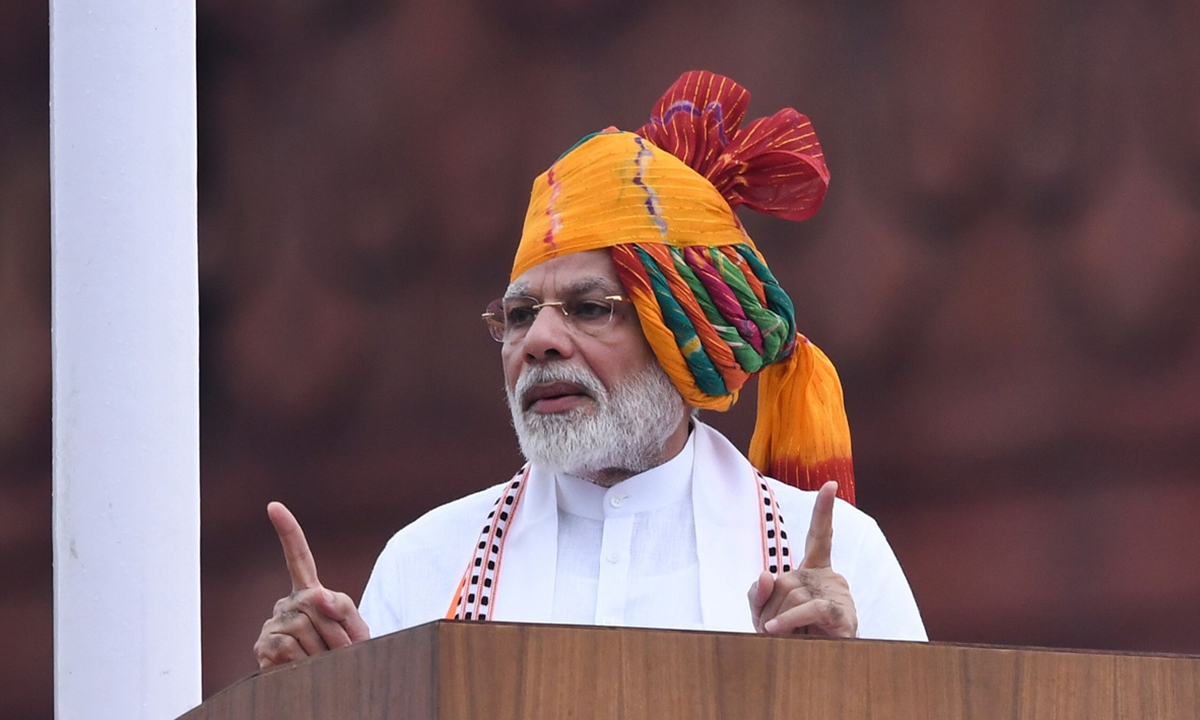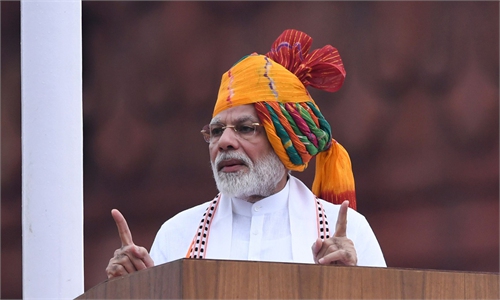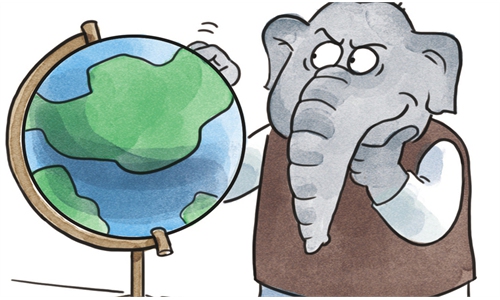Modi claims victory with alliance winning only narrow majority
Economic reform a difficult mission in his 3rd term: expert

Indian Prime Minister Narendra Modi File photo:VCG
Indian Prime Minister Narendra Modi claimed victory for a third term on Tuesday, as he released a statement on social media. Chinese experts said that however Modi's ambition to compete with Chinese manufacturing and improve India's business environment will be difficult to accomplish.
Given Modi's Bharatiya Janata Party (BJP) failed to secure an outright majority of seats despite his alliance got it, it will be hard for the prime minister to push economic reform but likely to play the card of nationalism, said experts, adding they expected that China-India relations are also unlikely to improve much.
Vote counting, which neared completion on Tuesday night, showed Modi's alliance winning albeit with a surprisingly narrow majority, media reported.
The trends spooked financial markets which had expected a hefty win for Modi, with stocks falling steeply. The blue-chip NIFTY 50 (.NSEI), opens new tab was down 4.8 percent and the S&P BSE Sensex (.BSESN), opens new tab was down 4.7 percent at 0833 GMT. The rupee also fell sharply against the dollar and benchmark bond yields were up.
Analysts said the market reaction shows that business and financial circles, as well as international capitalists, are not very confident in the future of India's economy.
Lin Minwang, deputy director at the Center for South Asian Studies at Fudan University, told the Global Times on Tuesday that the Modi administration will continue its internal and external policies, and of course Modi wants to boost economic reform and realize development, but this would be a difficult mission for him.
"Because his party has failed to secure a majority, it will be difficult for him to set the agenda for the complicated economic reform, and under this kind of situation, the BJP may further strengthen the measures to encourage Hindu nationalism among the country," Lin noted.
CNN reported on Tuesday that "One of the biggest challenges for India's new government will be to grow the manufacturing sector." Manufacturing constitutes less than 15 percent of India's GDP, according to the World Bank, but their growth in the sector is essential if India wants to become a global economic powerhouse.
Reuters reported on Monday that "Modi plans post-election reforms to rival Chinese manufacturing." The report said the Indian prime minister plans a raft of "business-friendly measures" if he wins a third term, including pushing through regulations making it easier to hire and fire workers, according to two government officials familiar with the matter.
However, the ambition of Modi and his party is difficult to realize, experts said. "India's business environment has had a poor record for a very long time, and it's not realistic to expect Modi to effectively fix it in his third term," said Hu Zhiyong, a research fellow with the Institute of International Relations at the Shanghai Academy of Social Sciences.
Lin echoed the view, pointing out that because reform in the fields like tax and labor that aims to match international standard is highly controversial in India, and in his third term, Modi is unlikely to make progress.
"Firstly, India's relevant policies do not have many advantages, and secondly, the government lacks necessary motivation to address the issue. Since 2019, the Modi administration was heading toward protectionism, rather than boosting opening-up," Lin said.
In the past, the Modi administration has made policies to attract foreign investments such as Production Linked Incentives Schemes, but these measures have achieved very limited outcomes. Many foreign companies and investors have realized that the India government pays lip service yet fails to deliver quite often, so they are less willing to invest and move their supply chains to the country, experts said.
For China-India ties, Chinese analysts are not confident there will be a major improvement. Hu told the Global Times on Tuesday that "after his reelection, Modi may make its external policies more hawkish and aggressive, and China-India relations are unlikely to see any major change."
Lin believes India will still be hostile toward Chinese firms, because the Modi administration's strategy aims at decoupling with China and boosting connections with the US-led West.
Liu Xiaoxue, an associate research fellow at the National Institute of International Strategy under the Chinese Academy of Social Sciences, told the Global Times on Tuesday that in order to develop its own manufacturing, the Indian government intends to embrace protectionism because China's manufacturing has a clear advantage over India's.
Although the China-India relations are at a low point in recent years, with shrinking exchanges between the two peoples, according to the latest data from the Indian institute Global Trade Research Initiative in May, China has overtaken the US to become the top trading partner of India, and the trade deficit with China is increasing. This proves that India still relies on Chinese products in many aspects and the decoupling approach adopted by the Modi administration in the past few years has failed, experts said.
"India's manufacturing sector relies on intermediate products like components imported from China, and these components are essential for various industries," Lou Chunhao, executive director of the Institute of South Asian Studies at the China Institutes of Contemporary International Relations, told the Global Times on Tuesday.
Despite containment launched by the US, China has established a comprehensive industrial ecosystem, especially in the manufacturing sector, presenting a significant advantage. Essentially, India can find components in the Chinese market for any type of manufacturing, Liu said.




